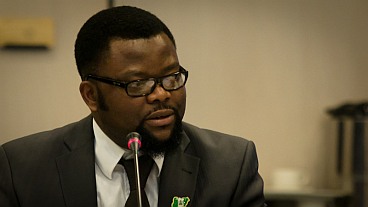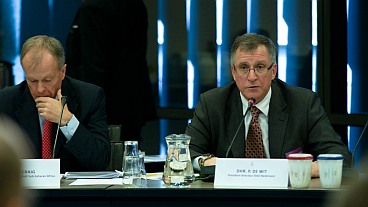Hearing on the Niger Delta: Shell admits mistakes
Hearing on the Niger Delta: Shell admits mistakes
On the initiative of SP Member of Parliament Sharon Gesthuizen, Dutch parliamentarians today questioned representatives of Shell regarding oil extraction in Nigeria. Dutch environmental group Milieudefensie (‘Environmental Defence’) and Amnesty International called the corporation to account for doing too little to maintain pipelines and to clean up pollution which had led in many places to fertile land being covered in a thick layer of oil. Shell also allows gas released during oil extraction to be wasted in widespread flaring rather than being put to good use. It has become clear that Shell acknowledges that the situation in the Niger Delta is more serious than it originally appeared.

Sunny Ofehe of the Hope for Niger Delta Campaign reports on the situation in the region.
The hearing attracted enormous interest, and the hall turned out to be too small to accommodate the public wanting to get in. National and international press were present to report on the gathering, the goal of which, Gesthuizen explained, was “to find out whether the figures and stated intentions of Shell add up.” Shell claims repeatedly that it does its very best to clean up the mess, but says that these efforts are thwarted by rebels and by their dependence on the Nigerian government. The company also regularly publishes figures regarding oil leakages, the clean-up and gas flaring. “I want to know also what the Dutch government can do in order to solve the problems in the Niger Delta,” Gesthuizen added.
Shell claimed in 2007 that 50% of the gas flares had been extinguished. Flaring sometimes occurs very near people’s houses, and as a result children are growing up in the stink and heat of a flame which reaches a temperature of more than 1,000 degrees Celsius. “In 2007 Shell burnt off half of the gas. In my view that in itself amounts to terrible waste and pollution,” said Gesthuizen, “but at the hearing it became clear that in 2011 80% of the gas flares are still burning. The situation has therefore deteriorated, according to Shell’s own figures. This raises the question of how the situation can now be so much worse than it was a few years ago? And how reliable in reality were the earlier figures?”

Peter de Wit, director of Shell Netherlands
There are a number of different factors which can cause oil leakages in pipelines. Shell says that these are in general to be blamed on sabotage rather than poor maintenance, but Gesthuizen notes that “in this case, too, the hearing created a new picture. According to Shell’s earlier figures, as many as 98% of the leakages were due to sabotage. But now they’ve come out with new figures, from which it emerges that in one case in three the cause was not sabotage, but overdue maintenance, and for this Shell must take full, or at least principal, responsibility. The SP is therefore calling on Shell in the strongest possible terms to clean up the mess from these leakages and repair the damage.”
According to Sharon Gesthuizen, Shell today showed its true face. The carefully polished image, of a corporation that sometimes unselfishly strives for a better world, has been blemished. “I asked why Shell could not speak out more openly against the corruption within the Nigerian authorities. From the answer you could see that for reasons of company strategy they like to keep things confidential, out of fear that openness might damage their corporate interests. In Shell’s view economic interests obviously come before the interests of the Nigerian people.”
Gesthuizen will take the opportunity provided by the hearing to ask the Dutch government what they can do to improve the situation in Nigeria. In addition, SP Euro-MP Dennis de Jong plans to organise a further hearing, this time at the European level, on oil extraction in Nigeria.
